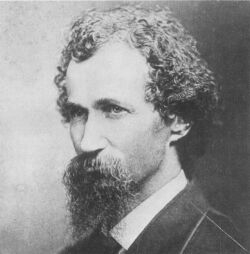Pytheas
Henry Kendall 1839 (Australia) – 1882 (Sydney)
Gaul whose keel in far, dim ages ploughed wan widths of polar sea—
Gray old sailor of Massilia, who hath woven wreath for thee?
Who amongst the world’s high singers ever breathed the tale sublime
Of the man who coasted England in the misty dawn of time?
Leaves of laurel, lights of music—these and these have never shed
Glory on the name unheard of, lustre on the vanished head.
Lords of song, and these are many, never yet have raised the lay
For the white, wind-beaten seaman of a wild, forgotten day.
Harp of shining son of Godhead still is as a voice august;
But the man who first saw Britain sleeps beneath unnoticed dust.
From the fair, calm bays Hellenic, from the crescents and the bends,
Round the wall of crystal Athens, glowing in gold evening-ends,
Sailed abroad the grand, strong father, with his face towards the snow
Of the awful northern mountains, twenty centuries ago.
On the seas that none had heard of, by the shores where none had furled
Wing of canvas, passed this elder to the limits of the world.
Lurid limits, loud with thunder and the roar of flaming cone,
Ghastly tracts of ice and whirlwind lying in a dim, blind zone,
Bitter belts of naked region, girt about by cliffs of fear,
Where the Spirit of the Darkness dwells in heaven half the year.
Yea, against the wild, weird Thule, steered the stranger through the gates
Opened by a fire eternal, into tempest-trampled straits—
Thule, lying like a nightmare on the borders of the Pole:
Neither land, nor air, nor water, but a mixture of the whole!
Dumb, dead chaos, grey as spectre, now a mist and now a cloud,
Where the winds cry out for ever, and the wave is always loud.
Here the lord of many waters, in the great exalted years,
Saw the sight that no man knows of—heard the sound that no man hears—
Felt that God was in the Shadow ere he turned his prow and sped
To the sweet green fields of England with the sunshine overhead.
In the day when pallid Persia fled before the Thracian steel,
By the land that now is London passed the strange Hellenic keel.
Up the bends of quiet river, hard by banks of grove and flower,
Sailed the father through a silence in the old majestic hour.
Not a sound of fin or feather, not a note of wave or breeze,
Vext the face of sleeping streamlets, broke the rest of stirless trees.
Not a foot was in the forest, not a voice was in the wood,
When the elder from Massilia over English waters stood.
All was new, and hushed, and holy—all was pure untrodden space,
When the lord of many oceans turned to it a reverent face.
Man who knew resplendent Athens, set and framed in silver sea,
Did not dream a dream of England—England of the years to be!
Friend of fathers like to Plato—bards august and hallowed seers—
Did not see that tenfold glory, Britain of the future years!
Spirit filled with Grecian music, songs that charm the dark away,
On that large, supreme occasion, did not note diviner lay—
Did not hear the voice of Shakespeare—all the mighty life was still,
Down the slopes that dipped to seaward, on the shoulders of the hill;
But the gold and green were brighter than the bloom of Thracian springs,
And a strange, surpassing beauty shone upon the face of things.
In a grave that no man thinks of—back from far-forgotten bays—
Sleeps the grey, wind-beaten sailor of the old exalted days.
He that coasted Wales and Dover, he that first saw Sussex plains,
Passed away with head unlaurelled in the wild Thessalian rains.
In a space by hand untended, by a fen of vapours blind,
Lies the king of many waters—out of sight and out of mind!
No one brings the yearly blossom—no one culls the flower of grace,
For the shell of mighty father buried in that lonely place;
But the winds are low and holy, and the songs of sweetness flow,
Where he fell asleep for ever, twenty centuries ago.
Font size:
Submitted on May 13, 2011
Modified on March 05, 2023
- 3:29 min read
- 53 Views
Quick analysis:
| Scheme | AABBCCDDEEFFGGCXHHII JJKKLLMNCC OOPPQQRRSS AANMDDTTUU VVWWYYSSGG |
|---|---|
| Closest metre | Iambic octameter |
| Characters | 3,781 |
| Words | 696 |
| Stanzas | 5 |
| Stanza Lengths | 20, 10, 10, 10, 10 |
Translation
Find a translation for this poem in other languages:
Select another language:
- - Select -
- 简体中文 (Chinese - Simplified)
- 繁體中文 (Chinese - Traditional)
- Español (Spanish)
- Esperanto (Esperanto)
- 日本語 (Japanese)
- Português (Portuguese)
- Deutsch (German)
- العربية (Arabic)
- Français (French)
- Русский (Russian)
- ಕನ್ನಡ (Kannada)
- 한국어 (Korean)
- עברית (Hebrew)
- Gaeilge (Irish)
- Українська (Ukrainian)
- اردو (Urdu)
- Magyar (Hungarian)
- मानक हिन्दी (Hindi)
- Indonesia (Indonesian)
- Italiano (Italian)
- தமிழ் (Tamil)
- Türkçe (Turkish)
- తెలుగు (Telugu)
- ภาษาไทย (Thai)
- Tiếng Việt (Vietnamese)
- Čeština (Czech)
- Polski (Polish)
- Bahasa Indonesia (Indonesian)
- Românește (Romanian)
- Nederlands (Dutch)
- Ελληνικά (Greek)
- Latinum (Latin)
- Svenska (Swedish)
- Dansk (Danish)
- Suomi (Finnish)
- فارسی (Persian)
- ייִדיש (Yiddish)
- հայերեն (Armenian)
- Norsk (Norwegian)
- English (English)
Citation
Use the citation below to add this poem to your bibliography:
Style:MLAChicagoAPA
"Pytheas" Poetry.com. STANDS4 LLC, 2024. Web. 31 Oct. 2024. <https://www.poetry.com/poem/17554/pytheas>.



Discuss the poem Pytheas with the community...
Report Comment
We're doing our best to make sure our content is useful, accurate and safe.
If by any chance you spot an inappropriate comment while navigating through our website please use this form to let us know, and we'll take care of it shortly.
Attachment
You need to be logged in to favorite.
Log In